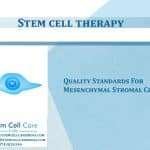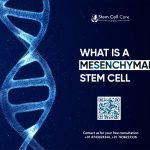Table of Contents
Adult stem cells known as mesenchymal stem cells (MSCs) have enormous potential for use in tissue engineering and regenerative medicine. They have special qualities that make them flexible instruments for a range of therapeutic uses. We shall examine the essential properties of MSCs, their origins, and their wide variety of medical uses. Stem cell therapy hospital use this cell to cure the ill and damaged tissue of the human body.
What Do You Mean by Mesenchymal Stem Cells?
Mesenchymal stem cells are multipotent cells that can differentiate into various cell types, including bone cells, cartilage cells, fat cells, and muscle cells. They can be isolated from various sources, such as bone marrow, adipose tissue, umbilical cord, and dental pulp.
It is important to note that the field of stem cell research is continuously evolving, and the scientific community is still exploring the full potential and limitations of mesenchymal stem cells.
Are You Aware of MSCs Properties?
MSCs are very appealing for therapeutic usage because they have a number of essential qualities. These characteristics include the ability to regenerate on its own, immunomodulatory actions, and the release of trophic substances that help in tissue repair and regeneration. Some of the properties are mentioned below:
- Multipotency
MSCs have the ability to differentiate into multiple cell types of mesodermal origin, including bone cells (osteocytes), cartilage cells (chondrocytes), and fat cells (adipocytes). This multilineage differentiation potential allows MSCs to contribute to tissue repair and regeneration.
- Self-renewal
MSCs have a strong ability for self-renewal, which means they can extensively divide and reproduce without losing their stem cell characteristics. This trait guarantees an abundant and sustainable source of cells for therapeutic uses.
- Immunomodulation
They possess immunomodulatory properties, meaning they can regulate the immune response and modulate inflammation. MSCs can encourage the development of regulatory T cells while suppressing the activation and growth of immune cells including T cells and natural killing cells. They are a promising clinical option for autoimmune diseases and illnesses because of their immunomodulatory properties.
- Paracrine effect
Growth factors, cytokines, and chemokines, among other bioactive chemicals that MSCs secrete and which might have paracrine effects on neighbouring cells, are just a few examples. These elements can lessen tissue fibrosis and damage while promoting tissue repair and angiogenesis (the growth of new blood vessels).
- Low immunogenicity
These cells have minimal immunogenicity, which makes it less probable that the recipient’s immune system will reject them. This characteristic makes MSCs a possible off-the-shelf therapy since it enables allogeneic (from a different donor) transplantation without the requirement for exact tissue matching.
- Safety profile
MSCs have shown a good safety profile in clinical trials and studies, with minimal risk of tumorigenicity or adverse reactions. This makes them a promising candidate for stem cell therapy in India.
Mesenchymal stem cells are a useful tool for regenerative medicine, tissue engineering, and immunotherapy, giving expected treatments for a variety of illnesses and ailments. This is due to their special characteristics. They are being used more effectively in many clinical settings because of ongoing research that is further examining their therapeutic experiments.
Did You Know How MSCs Are Used for Diseases?
Mesenchymal stem cells (MSCs) have shown great potential for a wide range of therapeutic applications due to their unique characteristics. Here are some notable uses of MSCs:
Regenerative medicine
The ability of MSCs to differentiate into diverse cell types, such as bone, cartilage, muscle, and fat cells, is one of their most impressive features. In order to cure conditions including bone fractures, cartilage abnormalities, and muscle injuries, they are employed in regenerative therapies to repair or replace damaged tissues.
Immune disorders
MSCs have immunomodulatory abilities that make them useful for treating immune-related diseases. They have the ability to modify autoimmune reactions, decrease inflammation, and regulate immunological responses. Multiple sclerosis (MS), systemic lupus erythematosus (SLE), and graft-versus-host disease (GVHD) have all been studied in relation to MSCs.
Cardiovascular diseases
MSCs have demonstrated promise in the treatment of cardiovascular diseases. They can boost heart tissue regeneration, encourage angiogenesis, and lessen the production of scars. Myocardial infarction, heart failure, and peripheral artery disease have all been in MSC-based therapeutics.
Neurological disorder
They have the ability to secrete neurotrophic factors that support neuronal survival and promote tissue repair in the central nervous system. They have been explored for the treatment of neurodegenerative disorders like Alzheimer’s disease, spinal cord disease, and Parkinson’s disease stem cell treatment.
Wound healing
The cells have demonstrated the potential in promoting wound healing and tissue regeneration. They can secrete growth factors, enhance vascularization, and modulate the local microenvironment to facilitate tissue repair. MSC-based therapies have been used for chronic wounds, burns, and diabetic ulcers.
Autoimmune diseases
For the therapy of autoimmune conditions like rheumatoid arthritis, Crohn’s disease, and systemic sclerosis, these cells have been researched. They have the power to inhibit abnormal immune responses, lessen inflammation, and encourage tissue repair.
Drug delivery
They can be utilised as carriers for targeted drug delivery. These cells can be engineered to express therapeutic genes or deliver specific drugs to disease sites, offering a potential solution for targeted and localised treatment.
Note: These are just a few examples of the diverse applications of mesenchymal stem cells. Ongoing research and clinical trials continue to explore and expand the therapeutic potential of MSCs in various fields of medicine.
Where are MSCs Found?
Mesenchymal stem cells (MSCs) are primarily found in several tissues throughout the body. Below are the places where they are found:
- Bone Marrow
One of the most abundant sources of MSCs is the bone marrow, where they reside in the stroma, a supportive tissue surrounding blood-forming cells.
- Adipose tissue
Adipose tissue also known as fat tissue can be easily obtained through a minimally invasive procedure called liposuction.
- Placental tissue
Another rich source of MSCs is placental tissue.
- Dental pulp tissues
The soft tissue within teeth is also a valuable source of MSCs.
There are more other places where they are found in the human body.
Ending Note
Mesenchymal stem cells offer immense potential in regenerative medicine and tissue engineering due to their unique properties. Stem Cell Care India is the leading stem cell therapy hospital India that uses MSCs for the treatment of several diseases because of their regenerative ability.
You can contact us to get more information about an efficient stem cell treatment for your condition.







